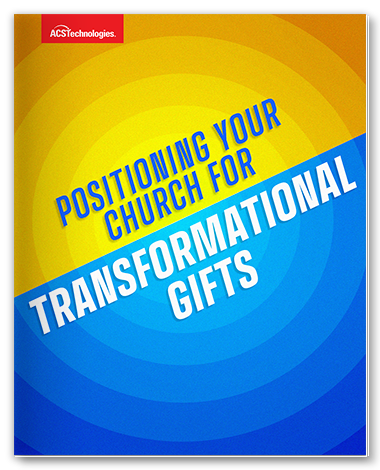In the red.
These are the words no church or nonprofit agency wants to hear.
A colleague of mine once worked for a nonprofit organization whose finances were decimated by poor leadership decisions. They were in the red in a major way without a clear path forward. The board president at the time took the reins and said he wanted to launch an emergency campaign tied to a planned giving effort. An idea met with considerable skepticism.
But the result was truly magic. Thanks to clear communication and education, donors made gifts to the immediate fiscal year’s needs and pledged estate gift commitments. Over the coming years – now into decades, the “legacy” fund dividends grew to become more than 40 percent of the agency’s annual budget.
Transformational Gifts
In this blog series, we’re looking at four ways to best position your church for planned giving: educating your members about planned gifts, communicating how your church would use and manage a large donation, and building a long-term strategy for endowing your ministries. In this post, we’re looking at education and communication.
Most churches don’t talk about planned gifts to their members at all. Of those who do, it’s likely a mention in passing or something only targeted at those age 70+. Other charitable organizations run circles around churches regarding securing legacy gifts. Education and communication is a key factor. So is starting early with younger donors.
Communication
In prior blogs, we’ve discussed the importance of clear, transparent communication with your church about your finances. Educating your members about an estate gift or endowed fund’s impact on your ministry is a natural addition to those materials. Include a paragraph in your fiscal reporting that shares ideas about how to make a lasting impact. As donors make estate and bequest plans, consider naming the church as a life insurance policy beneficiary or receive a designated amount or percentage of the estate.
In these communications, it’s important to outline how an invested endowment account would be (or is) used by the church to support its ministries year-round. Share the spending policy and how the invested funds are preserved for longevity while using the earnings to support the annual budget or special projects.
Let me be clear: we are not trying to compete with family or convince members to choose us over the beneficiaries they would normally include in their last estate gifts. But many people choose to leave a gift to a cause or organization that meant something to them in life. The church is rarely on that list despite its impact on the lives of its members.
Gift Reminders
Take a close look at your funeral and memorial service materials. I’m astounded how often a long-time church member’s obituary lists organizations to contribute to in lieu of flowers without mentioning their congregation. Just a simple “Should you wish to include the Hope Church in your obituary notice for memorial contributions, please use the language below: In lieu of flowers, the family requests donations in memory of Suzanne be made to Hope Church, 1234 Main Street, Township 09876.”
In the next entries of this series, we’ll talk about how to build a strategy and how to address the concerns donors might have about leaving the church with a sizable gift.
Position Your Congregation for Planned Gifts
Most churches don’t talk to their members about legacy or estate gifts at all. Unfortunately, other charitable organizations run circles around churches regarding securing planned gifts.
Learn techniques for education and communicating with your members. And about the power of leaving a lasting legacy through their estate and planned giving.
Considering a Capital Campaign?
Capital campaigns are a daunting task, even under the best circumstances. If you’ve been considering — or putting off — a capital campaign to raise funds. The solution is here, to grow your church or expand your ministry.
ACS Technologies® teamed up with Non-Profit DNA to offer an extensive and comprehensive consulting service to help make your upcoming capital campaign successful. This partnership gives you access to highly skilled, knowledgeable fundraising experts. They will help with your campaign — every step of the way.
Visit Capital Campaigns on our website to request your consultation today!
Tim has over 30 years of experience in Church, Non-Profit Administration, Management, and Fund Development. Serving as an Executive Pastor and Chief Development Officer in growing Churches and Non-Profit Organizations. He has provided a wide range of expertise and resources. Tim serves as the Founder and CEO of Non-Profit DNA. A boutique firm committed to helping nonprofits and churches. By building their capacity through fundraising, leadership, team building, staff recruiting, and coaching.





